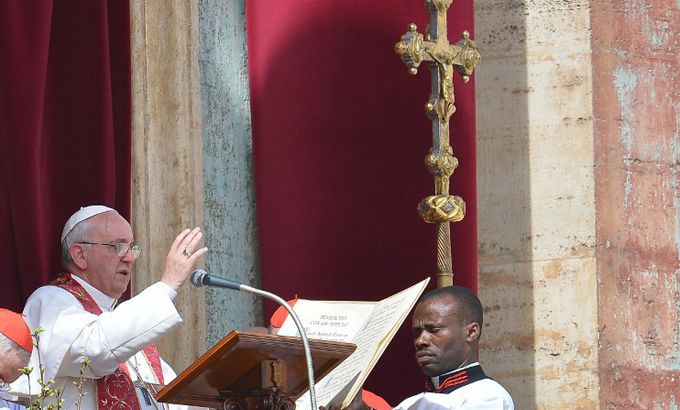Pope calls for peace in Easter speech
Newly elected pontiff presides over mass at St Peter’s Square marking holiest day in Christian calendar.

Pope Francis has offered his prayers for a “political solution” in Syria and for “reconciliation” on the Korean peninsula, in his first Easter message in front of tens of thousands of people gathered at St Peter’s Square in the Vatican.
In a special “Urbi et Orbi” blessing for Rome and the world on Sunday, Francis prayed for “dear Syria, for its people torn by conflict and for the many refugees who await help and comfort.
“How much blood has been shed! And how much suffering must there still be before a political solution to the crisis will be found?” he said.
Speaking in front of some 250,000 people from around, he also appealed to Israelis and Palestinians to end a conflict that lasted “too long”.
Francis delivered his message from the same balcony, where he made his first public appearance after his election on March 13.
On the Korean peninsula, Fracis prayed that the two Koreas overcome disagreements and “a renewed spirit of reconciliation grow,” a day after the North declared it was in a “state of war” with the South.
Unlike previous popes, who usually delivered their Easter Sunday speeches in different languages, Francis only spoke in Italian.
Before delivering his message, he presided over his first Easter mass, marking the holiest day in the Christian calendar.
Al Jazeera’s Hoda Abdel Hamid, reporting from the Vatican, said the “very joyous mood” during the mass reflected the excitement the Catholics feel towards their new leader.
Our correspondent also said that the new pope is also making public outreach to the Muslim world.
“He has only been pope for 17 days,” Abdel Hamid said. “But there are already indications that he wants to rekindle relations with the Muslim world, that has gone a bit sour” during the reign of Benedict XVI.
‘Desire for simplicity’
At an Easter Vigil in St Peter’s Basilica on Saturday, Francis reached out to non-believers and lapsed Catholics, urging them to “step forward” towards God.
Francis also marked Good Friday with a traditional torch-lit ceremony around the Colosseum in Rome, presiding over the re-enactment of Jesus Christ’s last hours and praying for Christians in the Middle East and for “our Muslim brothers”.
Brazilian, Chinese, Italian, Lebanese and Nigerian faithful took turns carrying a wooden cross around the Colosseum, where it is commonly believed that Christians were martyred.
Prayers read out at the ceremony were written by a group of Lebanese young people.
The Vatican has voiced concern over the fate of Christian minorities in many parts of the Middle East and the rise of radical Islam, as well as calling for an end to conflict in the region.
Vatican spokesman Federico Lombardi said the pope had shortened some of the lengthy Easter ceremonies as part of his “desire for simplicity”.
The pope, the former archbishop of Buenos Aires, was known in Argentina for his humble lifestyle, his outreach in poor neighbourhoods and his strong social advocacy during his homeland’s devastating economic crisis.
He began the most sacred season in the Christian calendar on Holy Thursday by washing the feet of 12 young prisoners, including women for the first time. One of the women is a Muslim Serb.
Popes performing the ceremony, which commemorates the gesture of humility believed to have been carried out by Jesus for his 12 disciples at their last meal, have usually washed the feet of priests.
Latin America’s first pontiff has set a markedly different tone from his predecessor, with a more open and informal style that is unusual in the Vatican halls of power.
Francis has already broken with several traditions, although he is yet to begin tackling the many problems assailing the Roman Catholic Church, including reform of the scandal-ridden Vatican bureaucracy and bank.